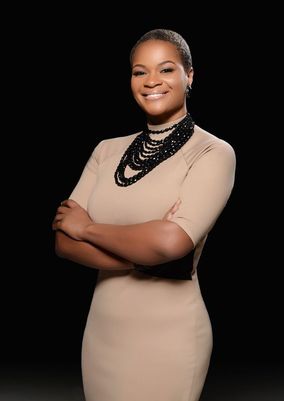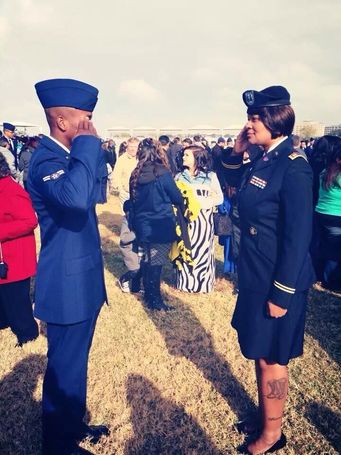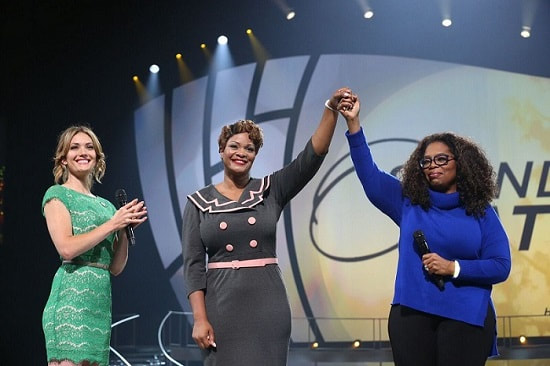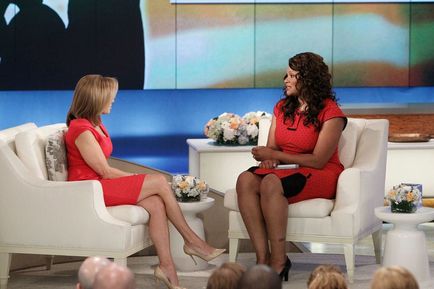July 2018 Featured Interview |
|
Interview with
Major Jas Boothe
U.S. Military Veteran, Cancer Survivor & Founder of Final Salute Inc.
Photo Credit: Phelan Marc
About Jas:
Maj. Jas Boothe grew up in Chicago, IL. She received a B.A. in Mass Communications from Mississippi Valley State University and dual master’s degrees in human resource management and management and leadership from Webster University. Jas is a U.S. military veteran, cancer survivor, philanthropist and author.
She joined the U.S. military and deployed during the Operation Iraqi Freedom and Operation Enduring Freedom campaigns. In 2005, she was a single parent in the Army Reserves and living in New Orleans when she learned she would be deployed to Iraq. During her mobilization, Jas’s life was torn apart by two significant events. In August of that year, she lost everything she owned due to Hurricane Katrina. Within a month, she received a devastating diagnosis of an aggressive head, neck, and throat cancer and was unable to deploy. She was facing discharge from the military, and she needed complex, full-time medical care, a job, and a place to live with her young son. The military directed her to the Department of Veterans Affairs, but she was told there were no existing programs for female veterans with children and that she should explore welfare and social services as an option. After dedicating years of her life to the military, Jas found herself homeless.
Things finally changed for the better. She responded well to treatment and later accepted a job offer from the Army National Guard. Afterward, she received an opportunity to return to full-time duty in Washington, D.C.
Jas was determined to ensure her sister veterans would have better options and resources in their time of need. In 2010, she founded Final Salute Inc. as part of her commitment to "never leave a fallen comrade.”
Jas is the recipient of numerous awards for leadership and community service, including the Standing O-vation Award (presented by Oprah Winfrey and Toyota), People Magazine’s Heroes Among Us, Tiffany Circle Distinguished Woman Warrior Award (American Red Cross), Department of Defense Spirit of Hope Award, and Woman of Distinction by the National Organization of Black Elected Legislative Women (NOBEL Women).
She is the mother of two boys and is married to a former Marine combat veteran.
Maj. Jas Boothe grew up in Chicago, IL. She received a B.A. in Mass Communications from Mississippi Valley State University and dual master’s degrees in human resource management and management and leadership from Webster University. Jas is a U.S. military veteran, cancer survivor, philanthropist and author.
She joined the U.S. military and deployed during the Operation Iraqi Freedom and Operation Enduring Freedom campaigns. In 2005, she was a single parent in the Army Reserves and living in New Orleans when she learned she would be deployed to Iraq. During her mobilization, Jas’s life was torn apart by two significant events. In August of that year, she lost everything she owned due to Hurricane Katrina. Within a month, she received a devastating diagnosis of an aggressive head, neck, and throat cancer and was unable to deploy. She was facing discharge from the military, and she needed complex, full-time medical care, a job, and a place to live with her young son. The military directed her to the Department of Veterans Affairs, but she was told there were no existing programs for female veterans with children and that she should explore welfare and social services as an option. After dedicating years of her life to the military, Jas found herself homeless.
Things finally changed for the better. She responded well to treatment and later accepted a job offer from the Army National Guard. Afterward, she received an opportunity to return to full-time duty in Washington, D.C.
Jas was determined to ensure her sister veterans would have better options and resources in their time of need. In 2010, she founded Final Salute Inc. as part of her commitment to "never leave a fallen comrade.”
Jas is the recipient of numerous awards for leadership and community service, including the Standing O-vation Award (presented by Oprah Winfrey and Toyota), People Magazine’s Heroes Among Us, Tiffany Circle Distinguished Woman Warrior Award (American Red Cross), Department of Defense Spirit of Hope Award, and Woman of Distinction by the National Organization of Black Elected Legislative Women (NOBEL Women).
She is the mother of two boys and is married to a former Marine combat veteran.
About Final Salute Inc.:
In 2010, Major Jas Boothe founded Final Salute Inc., a nonprofit organization designed to meet and understand the unique needs of homeless women veterans and their children. Besides transitional housing, Final Salute offers emergency financial support, free, professional business attire, educational classes in budgeting and saving, and other services and resources to help female veterans get back on their feet.
In 2010, Major Jas Boothe founded Final Salute Inc., a nonprofit organization designed to meet and understand the unique needs of homeless women veterans and their children. Besides transitional housing, Final Salute offers emergency financial support, free, professional business attire, educational classes in budgeting and saving, and other services and resources to help female veterans get back on their feet.
Myrna Beth Haskell, managing editor, spoke with Jas about her military service, the hardships she endured and was determined to overcome, and her work with Final Salute Inc.
Could you tell me a bit about your life prior to serving in the U.S. military?
I grew up in the projects of Chicago. I was determined to go to college and received a full athletic scholarship (for basketball). I majored in TV and radio broadcasting. I had plans to be a news reporter and anchor. I was so excited to start my career, but when I went in for an interview, they told me that I was too tall. Most of the other female broadcast journalists were much shorter than me, and they were afraid that I would look too tall next to the male broadcast journalists. I was a single mom, and I wanted to make my son proud of me. I wanted to prove that I was not a product of my upbringing. There’s a negative connotation for ‘single mom’ in our society. The military became a good option.
Could you tell me a bit about your life prior to serving in the U.S. military?
I grew up in the projects of Chicago. I was determined to go to college and received a full athletic scholarship (for basketball). I majored in TV and radio broadcasting. I had plans to be a news reporter and anchor. I was so excited to start my career, but when I went in for an interview, they told me that I was too tall. Most of the other female broadcast journalists were much shorter than me, and they were afraid that I would look too tall next to the male broadcast journalists. I was a single mom, and I wanted to make my son proud of me. I wanted to prove that I was not a product of my upbringing. There’s a negative connotation for ‘single mom’ in our society. The military became a good option.
|
You were a lieutenant in the U.S. army in 2005 and the mother of a young child when you were given a cancer diagnosis. Could you tell me about this difficult time in your life and how you became homeless?
I was living in New Orleans when I was given orders to go to Iraq. I was excited. This would be a leadership position, and it is what I had signed up for. I left my son with my aunt in Missouri. I was preparing to deploy to Iraq when Hurricane Katrina hit, and I lost everything. However, it wound up being a blessing in disguise. I hadn’t been feeling well, and I was in constant pain. I didn’t want to go to the doctor because I felt that it would be construed that I was too weak to lead. After the hurricane, I got a window of opportunity to go to the doctor. I was diagnosed with adenoid cystic carcinoma* which is a very rare form of cancer. It needed to be taken care of immediately. I was in treatment for months - surgery and radiation. Thankfully, I responded well to the treatments, so I went into remission. I had been unable to deploy with my unit due to my illness. I no longer had a mission, and I was discharged. *Adenoid cystic carcinoma is an uncommon form of malignant neoplasm that arises within secretory glands, most commonly the major and minor salivary glands of the head and neck. |
Jas salutes her grown son, Brandon, who is serving in the U.S. Air Force
Photo: Courtesty Final Salute Inc. |
And the military didn’t provide services to help you get on your feet?
Once you’re out of the military, they’re no longer responsible. I couldn’t work elsewhere because I still needed advanced medical treatment, but I was now a veteran, so the army sent me to the Department of Veteran Affairs for Support (VA). They told me that they only had services for male veterans and advised me to get welfare services and food stamps like other women in my situation (I was a single mom with a young child)*. I was sleeping on my aunt’s couch with no place of my own.
*70% of homeless women veterans are single mothers (www.finalsalute.org).
Once you’re out of the military, they’re no longer responsible. I couldn’t work elsewhere because I still needed advanced medical treatment, but I was now a veteran, so the army sent me to the Department of Veteran Affairs for Support (VA). They told me that they only had services for male veterans and advised me to get welfare services and food stamps like other women in my situation (I was a single mom with a young child)*. I was sleeping on my aunt’s couch with no place of my own.
*70% of homeless women veterans are single mothers (www.finalsalute.org).
Was this lack of assistance the inspiration behind founding Final Salute Inc.?
I thought that maybe my situation was a fluke in the system. Then, I saw this homeless, female veteran on the Oprah Show, and I realized that I wasn’t the only one. This was when I picked up the phone and started to make calls.
What is specifically lacking in the VA program for women? Was it designed more for male veterans in mind?
The housing in most shelters is geared for male veterans. Either they don’t take in kids at all, or there are restrictions on the age of the children. They also put women with men who are registered sex offenders. Who would ever want to be in that kind of shelter? Not me!
Tell me more about Final Salute Inc. What specific services do you provide women veterans and their children, and how many women and children have you helped since 2010?
I thought that maybe my situation was a fluke in the system. Then, I saw this homeless, female veteran on the Oprah Show, and I realized that I wasn’t the only one. This was when I picked up the phone and started to make calls.
What is specifically lacking in the VA program for women? Was it designed more for male veterans in mind?
The housing in most shelters is geared for male veterans. Either they don’t take in kids at all, or there are restrictions on the age of the children. They also put women with men who are registered sex offenders. Who would ever want to be in that kind of shelter? Not me!
Tell me more about Final Salute Inc. What specific services do you provide women veterans and their children, and how many women and children have you helped since 2010?
|
We’ve helped over 5,000 women and children in more than 30 states and territories. We provide transitional housing, job assistance and other resources provided by our research partners.
Our Next Uniform program is one of my favorites. It’s a life-altering experience for many of these women. This program provides free, professional makeovers, access to choose business attire and dress shoes, image consulting, professional headshots, or anything a woman might need to get back out into the workforce. These women vets are used to blending in with the men. We help them find their feminine side again as well as their self-esteem and confidence. The S.A.F.E. program is a preventative program. We don’t just help homeless vets, we also help women who are experiencing hardship so that they don’t become homeless. We provide emergency financial support and important educational classes on saving and budgeting. When you are with the military, you are part of a family. When you become a veteran, you lose that and become an individual. The S.A.F.E. program lets these women know that they are not alone. H.O.M.E. is our transitional housing program. |
Additional testimonials can be found from the Final Salute Inc. website.
|
Could you tell me more about the housing? This is group housing, correct? Do the relationships that these women form with their housemates also assist in them finding their self-respect and will to move forward?
We have a three-story, 9,000 square foot facility in Alexandria, VA which houses ten women and children. It’s an independent living facility in a group housing environment. They can stay for a period of up to two years. Each vet has her own room and bathroom, and her children get a room. We help women all over the country. It’s unfortunate, but we have to turn women away. There are just too many - we can’t take them all. So, we offer those we cannot take in a list of other organizations and resources that may be able to help.
The women who are housed together have a common goal and a special bond because of their participation in the military.
It must be extremely rewarding for you…knowing that you have been able to help your fellow female veterans so that they are not in the position you found yourself in. Could you tell me about one of the success stories that drives you to continue with your work?
We have a three-story, 9,000 square foot facility in Alexandria, VA which houses ten women and children. It’s an independent living facility in a group housing environment. They can stay for a period of up to two years. Each vet has her own room and bathroom, and her children get a room. We help women all over the country. It’s unfortunate, but we have to turn women away. There are just too many - we can’t take them all. So, we offer those we cannot take in a list of other organizations and resources that may be able to help.
The women who are housed together have a common goal and a special bond because of their participation in the military.
It must be extremely rewarding for you…knowing that you have been able to help your fellow female veterans so that they are not in the position you found yourself in. Could you tell me about one of the success stories that drives you to continue with your work?
|
Jas (center) receiving the Standing O-Vation Award
from Oprah Winfrey (right) and Toyota Photo: Courtesty Final Salute Inc. |
Well, there is really not just one that resonates with me – they all drive me to continue the work that I do. I do get personally involved, and I feel I have a duty to go beyond because we’re sisters in arms. I helped a reservist who had to leave for Afghanistan. The father of her daughter was also being deployed. We said we would take care of her daughter who was going on three. My younger son was four at the time, so this wasn’t easy. They had no one else to take care of her. This couple is now married, and Nyellie is now seven years old. My eight-year-old son and I just attended her birthday party yesterday.
You’ve received many awards for your outstanding community service. But what was it like getting the Standing O-Vation Award presented by Oprah Winfrey and Toyota? This must have been special for you. It was a blur! I mean, it was an ‘oh-my-god-Oprah’s-contacting-me!’ moment. I was thinking, ‘I’m actually on Oprah’s radar!’ I was born and raised in Chicago, and Oprah is a staple there. It was just unbelievable. |
Have there been any changes to how the VA assists female veterans since you founded Final Salute?
You know, the VA is trying, but they have a long way to go. For instance, there is a need for more female services, such as access to OB/GYN medical care. Some people have a great experience, but for some, it’s a nightmare. What we have to make sure of is that all vets across the board are being helped. It’s great because we’re being heard, but there’s still more to do.
You went back to the military full-time once you recovered. Are you still employed by the U.S. military?
I’ll be retiring. This is my last year in the Army Reserves.
According to a study conducted in 2009 on Veteran Homelessness by HUD and the VA: Women veterans are more likely to be homeless than their male counterparts. Women veterans are also four times more likely to be homeless when compared to female non-veterans in the U.S.
You know, the VA is trying, but they have a long way to go. For instance, there is a need for more female services, such as access to OB/GYN medical care. Some people have a great experience, but for some, it’s a nightmare. What we have to make sure of is that all vets across the board are being helped. It’s great because we’re being heard, but there’s still more to do.
You went back to the military full-time once you recovered. Are you still employed by the U.S. military?
I’ll be retiring. This is my last year in the Army Reserves.
According to a study conducted in 2009 on Veteran Homelessness by HUD and the VA: Women veterans are more likely to be homeless than their male counterparts. Women veterans are also four times more likely to be homeless when compared to female non-veterans in the U.S.
|
For more about
Final Salute Inc: |
Jas spreading the word about Final Salute Inc. on the talk show circuit
Photo: Courtesty Final Salute Inc. |






